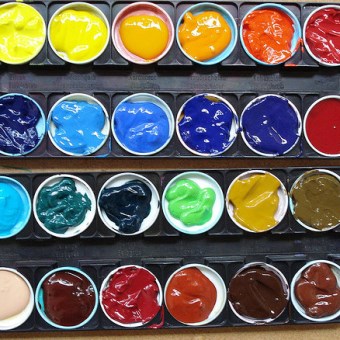CULTURE & ENTERTAINMENT
God and The Arts
Part 2: Creativity
By Kevin Stone
Since it is "but a shadow," what we create is not perfect. We are flawed creatures; something deep inside us was broken in the Fall. The Bible says our flaw is sin, a falling short of God's glory, and it has affected every part of us. The imago dei in us is no exception; it has been blurred like a letter in the rain. Even our purest, noblest art bears the marks of our fallen nature.
The Artist's Worst Critic
The honest artist sees the imperfections in his own work. Faulkner said of himself and his fellow writers, "All of us failed to match our dreams of perfection. So I rate us on the basis of our splendid failure to do the impossible." Unsatisfied with his work, Hemmingway rewrote the ending of A Farewell to Arms 39 times. His problem was, as he put it, "getting the words right." Dorothy Parker was equally discontent: "I can't write five words but that I can change seven." Monet admitted, "I'm never finished with my paintings; the further I get, the more I seek the impossible and the more powerless I feel." And Dali's counsel, "Have no fear of perfection — you'll never reach it," is very realistic advice, for a surrealist.
It's as if our ability to create has been vandalized — like Rembrandt's Night Watch — and like the famous painting, our creativity is worth trying to restore. After all, our love of beauty comes from God. As the psalmist desired "to gaze upon the beauty of the LORD," so should the Christian artist. We hunger for beauty, but we forget sometimes that holiness is beautiful, that God is beautiful.
The Sanctified Imagination
Christians should celebrate creativity for several reasons. First, the act of creating art can in itself be an act of worship toward God. In many places, the Bible speaks of God's people singing "a new song" of praise. For a song to be "new," there must be innovation, imagination, and artistic expression. The Author of music loves the new song. The Creator is delighted when His children create.
Second, art can provide enjoyment and refreshment for others in a weary world. Robert Frost wrote of a mower who spared "a tall tuft of flowers beside a brook." A later worker in the same field found the flowers and felt an instant kinship with his unseen co-worker, sharing his "sheer morning gladness at the brim." What a privilege for the believer to provide some cheer and brighten someone else's day.
Third, Christian artists have the freedom to share the good news in fresh and imaginative ways. The truth does not change, but the manner in which we present it may. God has communicated something of Himself through His creation. His "eternal power and divine nature" are clearly understood from what He has made (Romans 1:20). Likewise, our artwork communicates something of us. As new creations, "like God in true righteousness and holiness," we yearn most to communicate what has made the difference in our lives: the love of God in Christ. The Great Commission is not just for missionaries; it is for artists, too.
Our artistic endeavors may be, as Faulkner said, nothing but a "splendid failure," and there's pain in the process, but there's also pleasure and beauty and "sheer morning gladness." And when an artist uses his gifts to glorify the Lord, he brings a little bit of heaven to earth.
Image Credit: Joan M. Mas; "New watercolour palette selection"; Creative Commons
comments powered by Disqus
Published 2-28-2012

